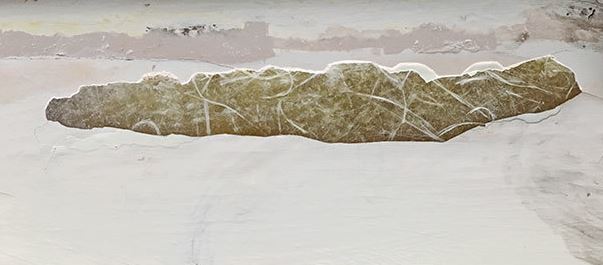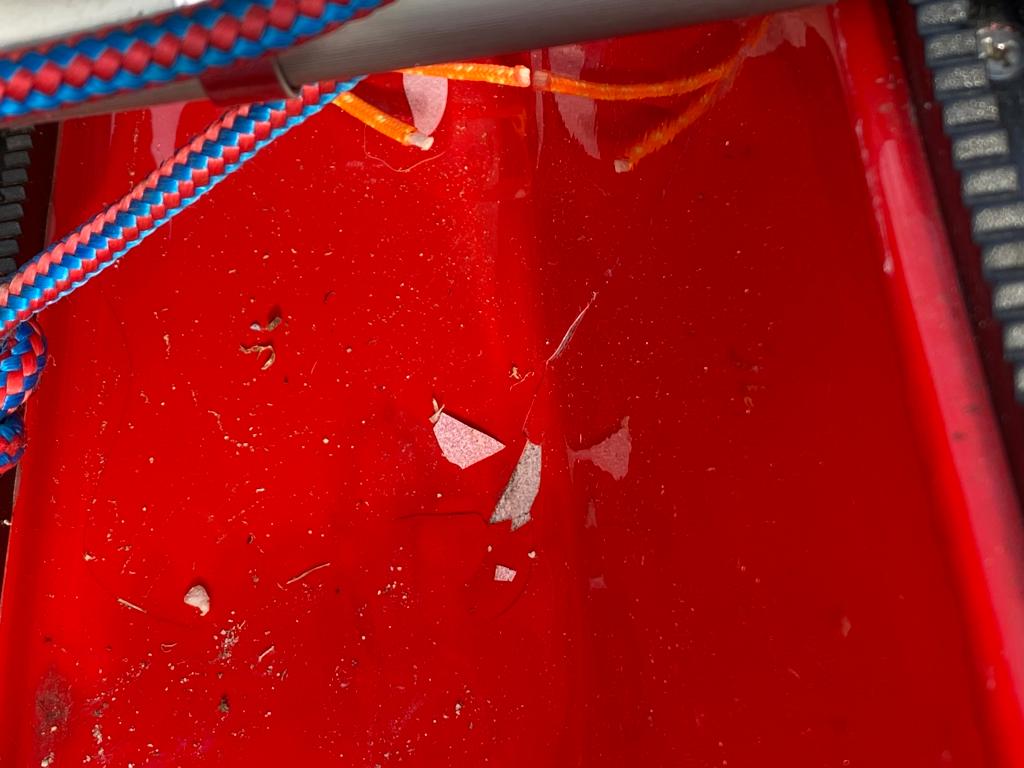

Safety equipment for Coastal Rowing Tours
The first coastal rowing tours have started again. This makes the topic of safety and safety equipment important again. Especially if you think about tours along the


A few days ago we talked about gelcoats in general and their function on Coastal Boats. Today we’ll go a little further and look at problems with the gelcoat – The topic: Help, my gelcoat is flaking off (Part 1: Self-inflicted). How can I prevent the cracking and flaking of the outer layer of my boat? Why does the gelcoat flake off? There are a couple of things to consider here: Temperatures and impacts.
The reasons for self-inflicted damage to the gelcoat can be manifold. They range from transport damage to temperature fluctuations and unnecessary impacts on the boat. Here are some of the reasons in detail.
Transport damage is the most common reason why gelcoats crack or flake off. However, this can be easily prevented. Use roof racks or trailer racks that are rubberized. Load your boat properly and make sure the boat is well-adjusted on the roof or trailer. Use V-wedges to rest the bow – if necessary – and fasten the wedges well. If the boat is not properly placed on the struts, or if it is not tightly lashed, there will be constant vibrations. The boat will then bounce up and down while you drive. This can very easily damage the gelcoat.
Finer cracks in the gelcoat are often stress cracks. They are often due to overstressing of the material at certain points: We recommend that you always unrig the boat, unless they are folding riggers, when transporting the boat. Folding riggers should be lashed down with cable ties. During transport, vibrations occur and the bolted connections of the riggers are subjected to a lot of stress every time you hit a pothole. This puts constant stress on the bolts and nuts over a long period. The permanent pressure or tension there can lead to cracks and spalling in the gelcoat.

Avoid storing the boat in the blazing sun for several days. Gelcoats respond to repeated expansion and contraction with temperature changes. The back and forth of temperatures cause cracks, which then become spalls that are difficult to repair. A boat cover is available for most Coastal Singles for less than 80€.
Check your boat after each trip and see if you find small cracks. It is possible that over time water may enter through these cracks and cause osmosis. Osmosis does not happen immediately and is only a problem after several months. However, it is a shame when something preventable happens.
Another reason for gelcoat cracking is short, blunt blows to the boat’s skin. So, in principle, similar to transport damage, only this time more direct and self-inflicted. Several examples come to mind – not that this has ever happened to me before… A tool falls on the boat, or the hull gets tangled with the trailer during unloading, or, especially annoying and possibly associated with swear words, one was inattentive for a small moment, and the boat fell off the boat trolley. What I’m saying is, that there are many reasons in which a blow to the boat’s skin can cause cracking and flaking of the gelcoat, and most of them are actually totally preventable.


Our summary: Treat your Coastal boat well and do proactive maintenance. Check your boat once more than you’d think is necessary. And don’t forget to clean it. However, not all gelcoat failures are due to our actions. A lot of them come with the boat. We will blog about gelcoat problems of some Coastal boat manufacturers another time!


The first coastal rowing tours have started again. This makes the topic of safety and safety equipment important again. Especially if you think about tours along the


What’s the best way to protect your Coastal Boat from the heat? And what can extreme heat do to your Coastal Boat? During the summer, many


The Baltic Sea near Gdansk offers a beautiful and diverse environment for various activities. It was also choosen as host for the 2024 European Coastal
| Cookie | Duration | Description |
|---|---|---|
| VISITOR_INFO1_LIVE | 6 months | YouTube sets this cookie to measure bandwidth, determining whether the user gets the new or old player interface. |
| VISITOR_PRIVACY_METADATA | 6 months | YouTube sets this cookie to store the user's cookie consent state for the current domain. |
| YSC | session | Youtube sets this cookie to track the views of embedded videos on Youtube pages. |
| Cookie | Duration | Description |
|---|---|---|
| sbjs_current | session | Sourcebuster sets this cookie to identify the source of a visit and stores user action information in cookies. This analytical and behavioural cookie is used to enhance the visitor experience on the website. |
| sbjs_current_add | session | Sourcebuster sets this cookie to identify the source of a visit and stores user action information in cookies. This analytical and behavioural cookie is used to enhance the visitor experience on the website. |
| sbjs_first | session | Sourcebuster sets this cookie to identify the source of a visit and stores user action information in cookies. This analytical and behavioural cookie is used to enhance the visitor experience on the website. |
| sbjs_first_add | session | Sourcebuster sets this cookie to identify the source of a visit and stores user action information in cookies. This analytical and behavioural cookie is used to enhance the visitor experience on the website. |
| sbjs_migrations | session | Sourcebuster sets this cookie to identify the source of a visit and stores user action information in cookies. This analytical and behavioural cookie is used to enhance the visitor experience on the website. |
| sbjs_session | 1 hour | Sourcebuster sets this cookie to identify the source of a visit and stores user action information in cookies. This analytical and behavioural cookie is used to enhance the visitor experience on the website. |
| sbjs_udata | session | Sourcebuster sets this cookie to identify the source of a visit and stores user action information in cookies. This analytical and behavioural cookie is used to enhance the visitor experience on the website. |
| Cookie | Duration | Description |
|---|---|---|
| __cf_bm | 1 hour | This cookie, set by Cloudflare, is used to support Cloudflare Bot Management. |
| CookieLawInfoConsent | 1 year | CookieYes sets this cookie to record the default button state of the corresponding category and the status of CCPA. It works only in coordination with the primary cookie. |
| elementor | never | The website's WordPress theme uses this cookie. It allows the website owner to implement or change the website's content in real-time. |
| wpEmojiSettingsSupports | session | WordPress sets this cookie when a user interacts with emojis on a WordPress site. It helps determine if the user's browser can display emojis properly. |
| Cookie | Duration | Description |
|---|---|---|
| __eoi | 6 months | Security for AdSense, AdSense for Search, Display & Video 360, Google Ad Manager, Google Ads |
| mailchimp_landing_site | 1 month | MailChimp sets the cookie to record which page the user first visited. |
| wp-wpml_current_language | session | WordPress multilingual plugin sets this cookie to store the current language/language settings. |
| yt-player-headers-readable | never | The yt-player-headers-readable cookie is used by YouTube to store user preferences related to video playback and interface, enhancing the user's viewing experience. |
| yt-remote-cast-available | session | The yt-remote-cast-available cookie is used to store the user's preferences regarding whether casting is available on their YouTube video player. |
| yt-remote-cast-installed | session | The yt-remote-cast-installed cookie is used to store the user's video player preferences using embedded YouTube video. |
| yt-remote-connected-devices | never | YouTube sets this cookie to store the user's video preferences using embedded YouTube videos. |
| yt-remote-device-id | never | YouTube sets this cookie to store the user's video preferences using embedded YouTube videos. |
| yt-remote-fast-check-period | session | The yt-remote-fast-check-period cookie is used by YouTube to store the user's video player preferences for embedded YouTube videos. |
| yt-remote-session-app | session | The yt-remote-session-app cookie is used by YouTube to store user preferences and information about the interface of the embedded YouTube video player. |
| yt-remote-session-name | session | The yt-remote-session-name cookie is used by YouTube to store the user's video player preferences using embedded YouTube video. |
| ytidb::LAST_RESULT_ENTRY_KEY | never | The cookie ytidb::LAST_RESULT_ENTRY_KEY is used by YouTube to store the last search result entry that was clicked by the user. This information is used to improve the user experience by providing more relevant search results in the future. |
Do you like our articles so far? You are always up to date with our newsletter